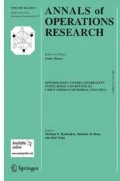Abstract
This study is motivated by the evidence of global warming, which is caused by human activity but affects the efficiency of the economy. We employ the integrated assessment Nordhaus DICE-2007 model (Nordhaus, A question of balance: economic modeling of global warming, Yale University Press, New Haven, 2008). Generally speaking, the framework is that of dynamic optimization of the discounted inter-temporal utility of consumption, taking into account the economic and the environmental dynamics. The main novelty is that several reasonable types of behavior (policy) of the economic agents, which may be non-optimal from the point of view of the global performance but are reasonable form an individual point of view and exist in reality, are strictly defined and analyzed. These include the concepts of “business as usual”, in which an economic agent ignores her impact on the climate change (although adapting to it), and of “free riding with a perfect foresight”, where some economic agents optimize in an adaptive way their individual performance expecting that the others would perform in a collectively optimal way. These policies are defined in a formal and unified way modifying ideas from the so-called “model predictive control”. The introduced concepts are relevant to many other problems of dynamic optimization, especially in the context of resource economics. However, the numerical analysis in this paper is devoted to the evolution of the world economy and the average temperature in the next 150 years, depending on different scenarios for the behavior of the economic agents. In particular, the results show that the “business as usual”, although adaptive to the change of the atmospheric temperature, may lead within 150 years to increase of temperature by 2°C more than the collectively optimal policy.
Similar content being viewed by others
References
Allgöwer, F., & Zheng, A. (2000). Progress in systems theory: Vol. 26. Nonlinear model predictive control. Basel: Birkhäuser.
Bréchet, Th., Eyckmans, J., Gerard, F., Marbaix, Ph., Tulkens, H., & van Ypersele, J.-P. (2010). The impact of the unilateral EU commitment on the stability of international climate agreements. Climate Policy, 10, 148–166.
Bréchet, Th., Gerard, F., & Tulkens, H. (2011). Efficiency vs. stability of climate coalitions: a conceptual and computational appraisal. The Energy Journal, 32(1), 49–76.
Bosetti, V., Carraro, C., De Cian, E., Duval, R., Massetti, E., & Tavoni, M. (2009). The incentives to participate in, and the stability of, international climate coalitions: a game-theoretic analysis using the Witch model. 2009.064 Note di lavoro, FEEM.
Carlson, D. A., Haurie, A. B., & Leizarowitz, A. (1991). Infinite horizon optimal control. Berlin: Springer.
Diehl, M., Bock, H. G., Schilder, J. P., Findeisen, R., Nagy, Z., & Allgöwer, F. (2002). Real-time optimization and nonlinear model predictive control of processes governed by differential-algebraic equations. Journal of Process Control, 12, 577–585.
Dontchev, A. L., & Rockafellar, R. T. (2009). Springer monographs in mathematics. Implicit functions and solution mappings. A view from variational analysis. Berlin: Springer.
Eyckmans, J., & Tulkens, H. (2003). Simulating coalitionally stable burden sharing agreements for the climate change problem. Resource and Energy Economics, 25, 299–327.
Findeisen, R., Allgöwer, F., & Biegler, L. T. (Eds.) (2007). Lecture notes in control and information sciences: Vol. 358. Assessment and future directions of nonlinear model predictive control. Berlin: Springer.
Greiner, A., & Semmler, W. (2005). Economic growth and global warming: a model of multiple equilibria and thresholds. Journal of Economic Behavior and Organization, 57, 430–447.
Greiner, A., Grüne, L., & Semmler, W. (2009). Growth and climate change: threshold and multiple equilibria. In J. Crespo Cuaresma, T. Palokangas, & A. Tarasyev (Eds.), Dynamic modeling and econometrics in economics and finance: Vol. 12. Dynamic systems, economic growth, and the environment (pp. 63–78). Berlin: Springer. ISBN:978-3-642-02131-2.
Haurie, A. (2003). Integrated assessment modeling for global climate change: an infinite horizon optimization viewpoint. Environmental Modeling and Assessment, 8, 117–132.
Haurie, A. (2005). A multigenerational game model to analyze sustainable development. Annals of Operational Research, 137, 369–386.
Kriegler, E., Hall, J. W., Held, H., Dawson, R., & Schellnhuber, H. J. (2009). Imprecise probability assessment of tipping points in the climate system. Proceedings of the National Academy of Sciences, 106, 5041–5046.
Nordhaus, W. D. (1992). An optimal transition path for controlling greenhouse gases. Science, 258(5086), 1315–1319.
Nordhaus, W. D. (1993). Rolling the DICE: an optimal transition path for controlling greenhouse gases. Resource and Energy Economics, 15, 27–50.
Nordhaus, W. D. (1993). Optimal greenhouse gas reductions and tax policy in the DICE model. The American Economic Review, 83, 313–317.
Nordhaus, W. D. (2008). A question of balance: economic modeling of global warming. New Haven: Yale University Press.
Nordhaus, W. D., & Boyer, J. (2000). Warming the world. Cambridge: MIT Press.
Solomon, S., Qin, D., Manning, M., Chen, Z., Marquis, M., Averyt, K. B., Tignor, M., & Miller, H. L. (Eds.) (2007). Contribution of working group I to the fourth assessment report of the intergovernmental panel on climate change. Cambridge: Cambridge University Press.
Stern, N. (2006). The economics of climate change: the Stern review. Cambridge: Cambridge University Press.
Yang, Z. (2008). Strategic bargaining and cooperation in greenhouse gas mitigations—an integrated assessment modeling approach. Cambridge: MIT Press.
Wolenski, P. (1990). The exponential formula for the reachable set of Lipschitz differential inclusion. SIAM Journal on Control and Optimization, 28, 1148–1161.
Author information
Authors and Affiliations
Corresponding author
Rights and permissions
About this article
Cite this article
Bréchet, T., Camacho, C. & Veliov, V.M. Model predictive control, the economy, and the issue of global warming. Ann Oper Res 220, 25–48 (2014). https://doi.org/10.1007/s10479-011-0881-8
Published:
Issue Date:
DOI: https://doi.org/10.1007/s10479-011-0881-8




